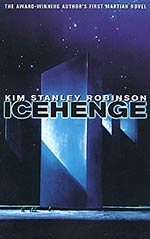
![]() BigEnk
BigEnk
9/24/2024
![]()
Icehenge was a surprise to me. I randomly picked this, Kim Stanley Robinson's first published novel, from my collection and was subsequently bewildered that it isn't a more discussed work. I'm partially convinced that the name itself is what prevented it from reaching a wider audience. It's a boring and uninspired name that speaks of space adventure more than the political mystery that it is.
Icehenge is a fix-up of two novellas written earlier tied together with one more that was written for the novel itself. It loosely follows a climate system specialist named Emma Weil, who lives through a mutiny on their ship and is subsequently brought into the fold of a planet-wide revolution taking place on her home world, Mars. The exact details of Emma's involvement in this revolution, and her subsequent disappearance, become the focal point of two archaeologists hundreds of years later, as they try to connect Emma and her peers to a mysterious landmark on Pluto. Each of the three novellas is told from a different perspective, each with a unique voice and emotions.
I can see how the novel would not be for everybody. It could be characterized as being dull and dry, even I found it to be so at points. There are certainly moments of faster paced action but that's not Robinson's strong suit here. It doesn't really have any 'big ideas' that the genre is famous for. Point being that I can see someone picking up this book (perhaps because of it's name and cover) expecting certain hallmarks of the genre, and upon not finding many being disappointed.
And yet Robinson still created something deeply human. It's a story of quiet and heartbreaking emotions, some that tie the three main characters together, and some that they shoulder alone. Despite being separated by time and space from each other they have significant cause and effect with each other. The humans in Icehenge live for over 500 years, which creates an unique set of emotional challenges that are described in detail. All three characters struggle to find purpose, an identity, and with the memory of their own lives as they age. These similarities bring real cohesion in the story, which is hard to attain when stitching pieces together from previous writing. This is something that I have seen other accomplished writers fail to do in their own fix-up novels, which raises my opinion of Robinson in his craft.
Icehenge is also hard science fiction book, concerned with some important ideas. Planetary- scale colonialism, government overreach, revolution, political activism, and the difficulties of science and academic work. It's a deep and textured work that take time to piece apart. The writing is strong and clear, sometimes even elegant or clever. I appreciate that Robinson writes the conclusion in a way that leaves you trying to answer some lingering questions yourself, which actively inspires critical thought and consideration. I'm looking forward to exploring more of Robinson's bibliography to see if he carries/improves on this excellent start.